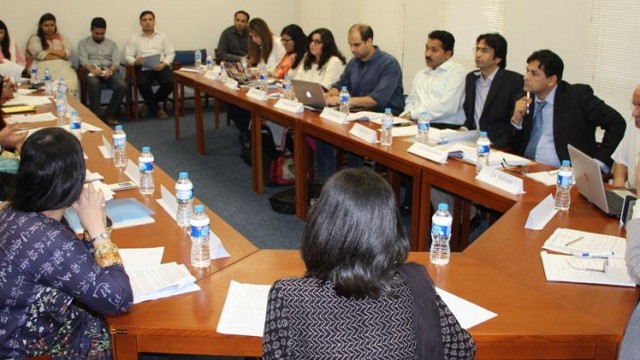LUMS Round Table Conference on Prevention of Electronic Crimes Bill, 2015 at SAHSOL
News updates from LUMS:
The Shaikh Ahmad Hassan School of Law (SAHSOL) organised a Round Table Conference on October 8, 2015 on ‘Prevention of Electronic Crimes Bill, 2015.’ The Conference entailed an interactive discussion on the content and possible legal, socio-political and economic impact of the Bill. The Round Table was attended by eminent activists including I. A. Rehman (HRCP), Farieha Aziz (Bolo Bhi), members of the Digital Rights Foundation and prominent legal practitioners, such as Asad Jamal and Saroop Ijaz. The conference included a representation on the FIA by Deputy Director Cyber Crimes Wing, Syed Shahid Hassan. Other panelists included: Adnan Ahmad, Ali Kamran, Anoosha Shaigan, Gul Bukhari, Haris Ramzan, Imran Zia, Khurram Zafar, Maria Farooq, Nabiha Meher, Nighat Dad, Noor Bano, and Saqib Jillani.
The discussion initiated with an overview of the previous and existing laws pertaining to cyber space in Pakistan by Dr. Ali Qazilbash , which was further substantiated by Farieha Aziz. Saroop Ijaz then emphasised the overarching theme of infringement of privacy, and the implication of limitations in Article 19 of the Constitution of Pakistan, which still remain unresolved. While Khurram Zafar raised questions about the economic viability of the law, Maria Farooq emphasised how the purpose of the law was unclear. I. A. Rehman pointed out how the Bill had adopted terminology similar to that of the colonial laws, and is illustrative of the legislators’ attempt of curbing free-thinking, and acting to control the minds of the population. Marva Khan pointed out the internationally recognised limitations on free speech (hate speech, slander, and obscenity), and discussed how the Bill significantly added to these restrictions in circumscribing the right.
There was further debate on some of the highly problematic provisions in the Bill, including how an offence has been defined as an crime committed under the said law by anyone over the age of 10 years (Section 2(x)); effectively categorizing journalists and whistle-blowers as cyber criminals (Sections 3 and 4); and severe speech implications imposed by provisions such as Section 9, which entails very abstract language such as “glorification of an offence”.
Recommendations forwarded by the panelists, towards the end of the Conference included the need for personal data protection and privacy laws; the need to compartmentalise the law in accordance with the various domains it encompasses; engaging the MNAs and Senators in order to have the problematic provisions of the Bill amended or removed; and to formulate separate laws to govern the Internet Service Providers (ISPs).
This Conference was conducted under the Initiative on Internet and Society (IIS) at LUMS, the aim of which is to explore the development of cyberspace in Pakistan. “Internet and Laws” is one of the three streams of IIS, which specifically addresses social, policy and information law issues in the country, encompassing internet law, cyber regulation and internet freedom.
The Round Table was organised by Dr. Ali Qazilbash, Chair of SAHSOL, and Marva Khan, Teaching Fellow at SAHSOL, who were duly assisted by Khalid Mehmood Siddiqui, Muhammad Imran and other staff members.
http://lums.edu.pk/news-details.php/round-table-conference-on-prevention-of-electronic-crimes-bill-2015-at-sahsol-3627


